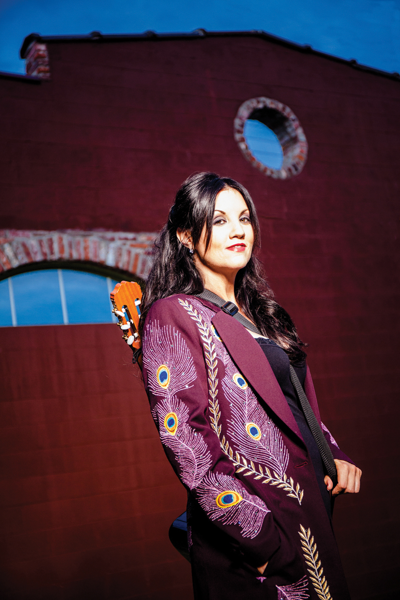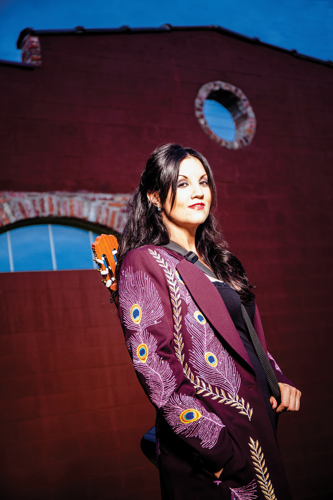Indie country singer Stephanie Urbina Jones remembers awakening to the sound of gunfire. Even at 8 years old, she wasn't frightened. She was sleeping next to her grandmother when the shots rang out.
"I remember hearing gunshots outside the window, but I wasn't scared," she tells the Scene. "My grandmother got up and, true to what I think is a Latina thing, she got dressed and put her red lipstick on and her earrings."
It was well past midnight. Jones and her grandmother knew a knock on the door might soon come, as it often did when someone needed help in the barrios of West San Antonio, Texas. Immigrants, documented and undocumented alike, knew her grandmother ran an underground railroad, of sorts. When they arrived at her door, they called her Señora Jones.
"Most of the time they would speak in Spanish," Jones recalls. "It could be they had just come across the border and needed immigration papers. Other times they needed help at the hospital, or their kid is in jail. You know, life circumstances that sometimes arise, and she would help them navigate their new world."
Jones draws deeply from her Mexican heritage, just as Señora Jones would envision on her deathbed. But her mother didn't share this vision; she knew all too well the challenges her mixed-race daughter might face if she were to identify too closely with her heritage. She refused to teach her daughter Spanish, more as an act of protection than xenophobia, Jones explains.
"I was born into a Mexican-American household," she says. "My mother was a gringa, and at that time in Texas, that was not an accepted thing. I didn't really look Hispanic — my skin is not particularly dark — and my mother told me to never tell anyone. I felt ashamed."
Years later, at the age of 32, while "midwifing [her grandmother] from this world to the next," her perspective evolved.
"I had this otherworldly experience," she recalls. "For a week, my grandmother had one foot in both worlds — it was the holiest experience I've had in my life, and it changed my everything."
The singer's grandmother — fragile and weak, but coherent — spent her last days lovingly speaking to relatives who had died years before as if they were in the room, then turned her attention back to Jones. In her final hours, she says, her grandmother made an unexpected — and profound — statement: "Mija [translation: my little girl], you will be a voice for our people. You will carry our culture in song around the world."
"I felt like the most unlikely, unworthy and insufficient person to carry the culture," Jones recalls, "and I thought: 'How can I do that?' "
At the time, Jones was a songwriter at Music Row powerhouse Sony/Tree Publishing; she had not yet considered a career onstage. She had recently co-written the title cut to Lorrie Morgan's 1997 album Shakin' Things Up with Shaye Smith. But if she was going to bring her grandmother's vision to fruition, she'd need to start shaking things up herself. So she became a student of Mexican culture, starting with learning to speak Spanish, and she started performing at writers' nights around Nashville and in Texas.
Today, she's a touring singer-songwriter based out of East Nashville. She's performed around the world, including a nine-country tour this summer. Shortly after emerging as an artist, she sang a duet with Willie Nelson at his world-renowned Fourth of July Picnic in Austin, and just this month she performed with Vince Gill and The Time Jumpers at 3rd & Lindsley, where she returns as a headliner on Thursday.
But perhaps her biggest break so far came last winter, when eventual The Voice winner Craig Wayne Boyd sang "My Baby's Got a Smile on Her Face" — a song Jones co-wrote with Mark Marchetti — in the reality show singing competition's crucial final round. The performance pushed Boyd's recording of the song (which the singer's team leader, Blake Shelton, twice had on hold but never cut) to No. 1 on Billboard's Hot Country Songs chart.
"That song changed everything," Jones says. "After years of trying, it infused more fire in me — doors finally flew open. Every cent I've made from that single I've poured into my new album, Fiery Angel, with genuine gratitude."
In October, Jones self-released the album — her fifth solo effort. Angel heavily reflects the singer's Tex-Mex roots, and she hopes it hips Music Row to an unmet opportunity for country music to embrace Latin swing.
"The music on this album is fiery," she says. "It comes from the dance halls in Texas. Country music is the genre of choice [for much of America's Hispanic community], and they don't have anybody representing who they are and their heritage. My intention is to bring the beauty of this culture to the entertainment world."
Email Music@nashvillescene.com






